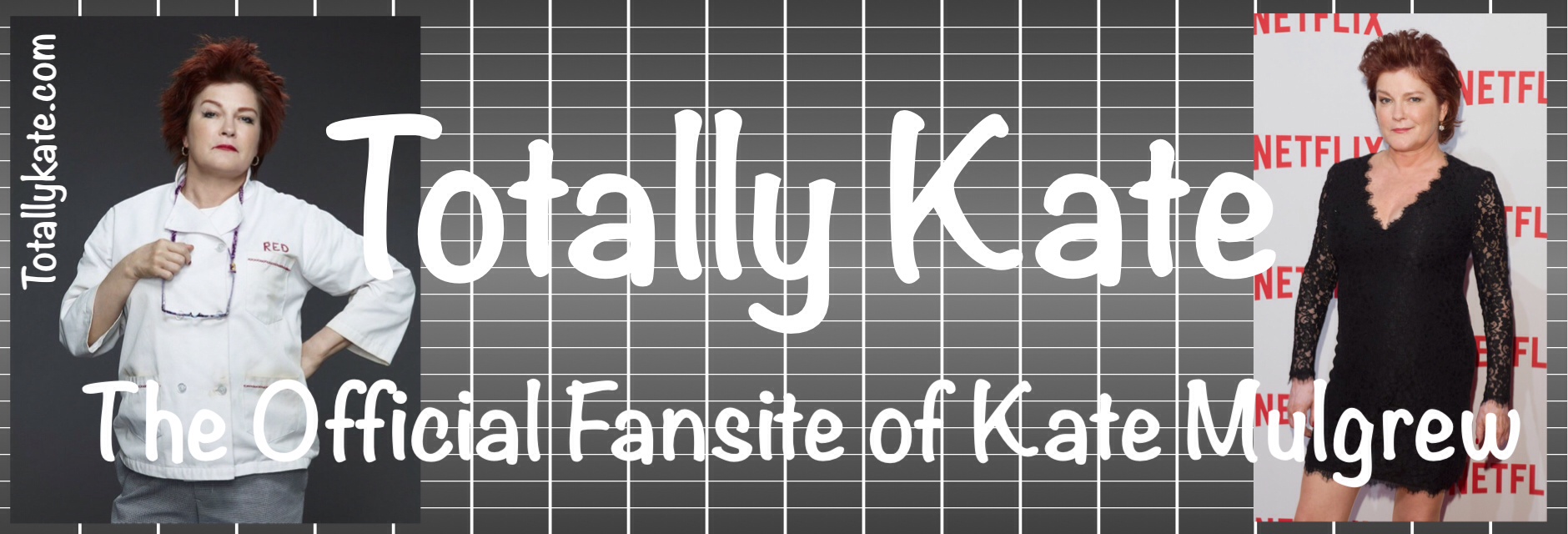Jenica Bergere
French Stewart
Joe Califano
Kate Mulgrew
Bill: All right, welcome to the show. Thank you very much. And let us meet our panel. She plays Donna French on the hit comedy "Ink," on a network we'll call "Network C." Jenica Bergere right over here. Hey, baby, I don't want to say your network, but you know what I mean.
[ Applause ]
He is Harry on the hit series "3rd Rock From the Sun" on a network that starts with "N," French Stewart.
[ Cheers and applause ]
Hey, welcome back.
French: Thank you.
Bill: This man was the former Secretary of Health, Education and Welfare and the current chairman of the National Center on Addiction and Substance Abuse. Joseph Califano. Hey! Great pleasure to meet you. I've read a lot of you over the years.
[ Applause ]
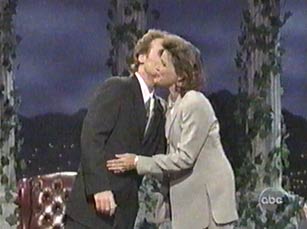 And
finally, she's Kathryn Janeway, Captain on "Star Trek: Voyager" on that
"U" network. Kate Mulgrew, right there.
And
finally, she's Kathryn Janeway, Captain on "Star Trek: Voyager" on that
"U" network. Kate Mulgrew, right there.
[ Applause ]
Hey, baby, great to see you.
Kate: Nice to meet you.
[ Applause ]
Bill: Okay. Well, welcome aboard. Listen, there was a very important Supreme Court ruling this week which upheld a ban on billboards, I think it was in Baltimore, wasn't it? Where they were advertising, you know, cigarettes and alcohol on billboards as they do. And the Supreme Court said, it's okay if we never have to see that again, which -- now, I'm certainly all for kids not using these products. I mean, kids barely have enough money to buy guns --
[ Laughter ]
-- Nowadays. But I'm wondering if this fight to stop kids from getting on drugs and alcohol and cigarettes, which they're gonna say is a drug as well, is best fought this way. I mean, shouldn't kids be taught that under capitalism, people are going to try to sell you things and you better learn to resist sometime?
Kate: I think we're too easy.
Joe: Yeah, I think kids are, you know, you have this array of people accountants, people that know how to make ads, people that know how to sell things.
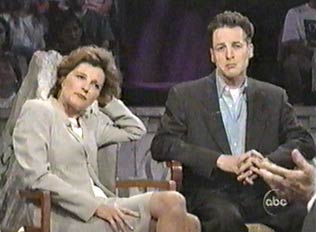 Bill:
That's America, man.
Bill:
That's America, man.
Joe: Yeah, but not to focus on our kids. To get them to take stuff that hooks them, which cigarettes do. We now know the cigarette companies have lied for years. It hooks them.
Bill: But kids know cigarettes are bad for you. Everybody knows.
Kate: They know tobacco is bad for them, right? But they are at the most impressionable stage. I've got two teenage boys and I hit them with this question last night at dinner. And they said, "Mother, smell the coffee. The message is clear." It's insidious, they don't quite speak that way. But the message is clear when I see beer ads and liquor ads and cigarette ads, the world is saying to my -- my culture is saying to me, "just hang on to your hats and you can have it."
French: Sure, but the thing is that you can't -- I don't feel comfortable taking a legal product out of the public eye just because -- I think it's a parenting issue. You've got to raise your parents -- I mean, you've got to raise your children.
[ Laughter ]
No, I mean, it's -- it's a matter of -- if Stoli wants to use a cuddly panda bear, a cigar-smoking, vodka-swilling panda bear to sell their product, I think it's crude but I think it's the price tag. And certainly, they've got a lot of other things, what with the Internet, they've got to sort through that. I say it's time to teach them to put on their little Wonder Woman deflectors and go -- and go out into the world and take care of themselves.
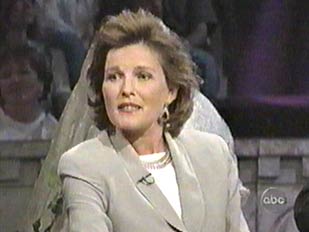 Kate:
Do you believe in a world of free trade?
Kate:
Do you believe in a world of free trade?
French: Absolutely.
Jenica: If they're going to advertise drugs and drinking or the selling of tobacco and alcohol, hard liquor, at least advertise it as it really is. Because every commercial is like these cool kids with these cool --
Kate: Yeah, but come on --
Jenica: So show the prom queen vomiting over the king.
[ Cheers and applause ]
Now you're talking!
Kate: You're absolutely right.
Joe: That camel has smoked enough cigarettes to die of lung cancer a hundred times. But the camel keeps smoking and kids started smoking camels because of old Joe Camel.
Bill: No, no, no.
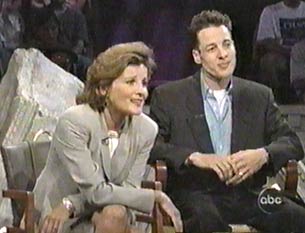 Kate:
Because of the naked lady in it, did you know that?
Kate:
Because of the naked lady in it, did you know that?
Joe: Camel -- but their cigarettes went up tremendously.
Bill: But there are models in -- and people in movies who are a lot cooler than Joe Camel smoking.
[ Laughter ]
French: My feeling is that I'm a smoker and I'll probably -- I haven't been able to quit -- and I'll probably end up smoking a Marlboro out of my neck.
[ Laughter ]
I'm sorry, but this is -- you don't hear me blaming Bette Davis, you know what I mean? It's my deal. It's my fault. If I want to be an idiot, it's --
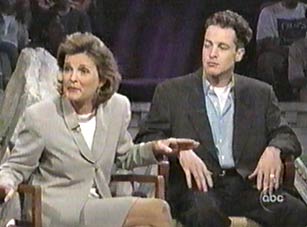 Kate:
I agree with you, but I think you probably don't have children in the house.
And the bottom line for me is I've got a 13 and 14-year-old. The greatest
sorrow in all this for me is the loss of the greatest advertiser in television,
which is the Budweiser campaign. It is the cleverest and the most amusing
and the best done ads. But if that ad, however insidiously, encourages
my son to have a couple of brews on the way home from a dance, smash into
a semi and end his life, it is no longer acceptable.
Kate:
I agree with you, but I think you probably don't have children in the house.
And the bottom line for me is I've got a 13 and 14-year-old. The greatest
sorrow in all this for me is the loss of the greatest advertiser in television,
which is the Budweiser campaign. It is the cleverest and the most amusing
and the best done ads. But if that ad, however insidiously, encourages
my son to have a couple of brews on the way home from a dance, smash into
a semi and end his life, it is no longer acceptable.
Jenica: So show the frog drunk and then show them drinking Jack Daniels cheating on their wife. That's how you can advertise.
[ Applause ]
Bill: Okay, we'll take a break and we'll come back to this.
[ Applause ]
[ Applause ]
Bill: Okay. We were talking about liquor, smoking, drugs and so forth. Now, I know you were a smoker for many years.
Joe: Actually, I started smoking because I saw Humphrey Bogart smoke and I saw Jimmy Cagney smoke, and I saw Edward G. Robinson smoke.
Bill: They may get rid of the cigarettes in the billboards but the people in TV and movies, the coolest people are always --
Joe: In the movies in the '80s, they didn't smoke, Bill, and we had a tremendous decline in young smoking. And they're back smoking again.
Bill: When did they ever stop smoking?
Joe: Oh, they did stop smoking, oh, yes. And now they're smoking again like crazy. I mean, Bruce Willis, after he knocks two or three people off, he lights up a cigarette.
[ Laughter ]
Bill: That's sex to him.
[ Laughter ]
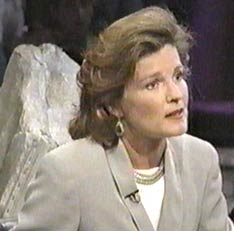 Kate:
Culture isn't smoking as much. Any smoker will tell you.
Kate:
Culture isn't smoking as much. Any smoker will tell you.
French: No, you're hustled into a corner, which is -- It's fine. I feel like -- well, I mean actually, if you live in California and you're complaining about secondhand smoke, you know --
[ Laughter ]
Move to Colorado. But --
[ Applause ]
I mean, but I want to be a courteous smoker and I'll go over into my corner. That's no problem. But I feel like this whole thing, it's part of a thing that as we Americans do, which is -- we don't go after the root of the problem. I mean, you know, you got -- you got a couple of rednecks throwing lawn darts up in the air and Jethro takes one in the head. All of the sudden, nobody gets lawn darts, you know?
[ Laughter ]
Nobody gets anything.
Kate: You've got a very good point, Bill.
Joe: You can eat alone, you can drink alone, but you can't smoke alone if I'm in the same room with you because you're blowing your --
French: But life is a dangerous bit of business.
[ Laughter ]
You know, I don't like some squealing baby on the plane, but I take it like a man, you know?
[ Cheers and applause ]
Bill: And this country -- this country is has a peculiar habit of pointing out certain things that are bad for your health, but not others.
Kate: -- So distant, it becomes so Puritanical.
French: Right.
Bill: And that baby could cause as much stress -- that baby is why he smokes.
[ Laughter ]
You know?
Joe: But they wouldn't let him smoke on the airplane.
French: I can argue that in court. I mean -- I think it's about responsibility and taking responsibility for teaching your kids and taking responsibility for teaching yourself. I mean, if you're suing somebody because, you know, you spilled your hot coffee in your lap, blow on it!
[ Laughter ]
That's the first thing you ever learn.
Kate: I'm asking you how I am supposed to take responsibility as a mother.
French: As a mother.
Kate: Do you think I can be that vigilant? They're 14 years old.
French: No, you can't. You do the best you can and then you send them out.
Kate: What's the best I can when they come home drunk or they've had some terrible traffic accident?
French: Well, but I mean the thing is you give them as much of the base as possible. You send them out, you can't clean everything up, you put them out there. And life is dangerous. And there's no amount of safety that's gonna help everybody.
Jenica: He's his own mom and dad.
French: Yeah, that's right. I don't need none of y'alls.
Kate: It's going to make it a little bit easier on women like me if my kids cannot get a beer, a joint or a cigarette. Right?
Bill: But your kids can always get those.
[ Laughter ]
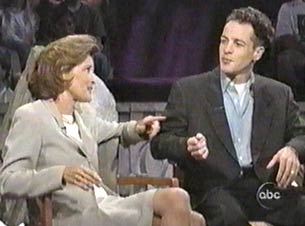 Kate:
We're talking about just my kids. I'm saying if that were.
Kate:
We're talking about just my kids. I'm saying if that were.
Joe: This stuff is available in this country. It's going to be available to kids. What you do as a parent is the most important thing. And everything we've done at Columbia to work at our center, two things -- two most important things. If you can get a kid through age 21 without drinking, without abusing alcohol, I'm sorry, without smoking, without using drugs, that kid is home free for the rest of his life. And secondly, it's all in the family. It's all in the family. And the way you live -- " those were the days ".
[ Laughter ]
Kate: I grew up in an Irish-Catholic family where we all had drinks at the age of 16. And I don't think we were all staggering around.
Jenica: 21 is so frightening to teenagers. Because when you're 17, your hormones say, "I need to be independent. I need to prove something. I want to go with an older guy, I want to go out with an older girl, I need to be independent. So because 21 is my reward for drinking, I'm gonna do it now." It like almost forces kids to drink, forces them to be like their parents ---
Bill: The whole method of keeping stuff away, that it doesn't exist, hasn't all of our government policy been toward that and hasn't it been proved to be an enormous disaster? Shouldn't we take another approach that, yes, it's out there. Because I tried to quit -- I did finally quit, but like the first five times I quit, I tried to quit by not having the cigarettes around. You can't do that. They're ubiquitous. You have to quit with a pack right in your hand. It has to take place up here. And that's where you have to teach the kid. You can't have it and not be around.
Joe: Look, but the extent to which it's around has an impact on how much kids do it. We have millions of kids that drink, millions of kids that smoke. A far smaller number of kids use drugs, including marijuana. Why? Because it is less accessible, and --
Bill: Oh, please. Marijuana is easier to get than everything. They just had a --
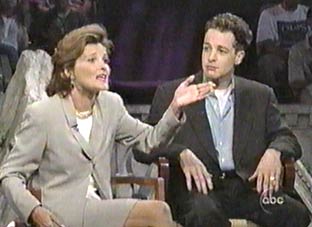 Kate:
I don't agree with that.
Kate:
I don't agree with that.
Bill: Then you don't know how to get it.
[ Laughter ]
We have to take a break. We'll be back.
[ Applause ]
[ Applause ]
Bill: Okay, we're back. We're talking about the drug problem, and we were, I guess, you said to me, I'm glad you came here for this.
Kate: Yeah, thanks a lot.
Bill: So we can scare you about your kids.
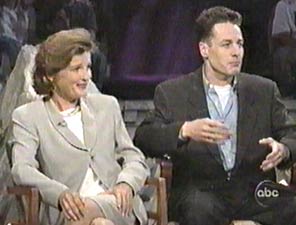 Kate:
Yeah.
Kate:
Yeah.
Bill: But I watched all of the shows our network had on in March when we had our March against drugs month, and one of them was all about how kids can get marijuana easier than anything else.
[ Heavy sighs ]
I'm sorry to tell you that.
Joe: Kids -- cigarettes are the most accessible things to kids. And alcohol --
Bill: But you have to go to a store.
Joe: It's still very easy. It's very easy. And it's accessibility and acceptability for stuff. And that's why more kids drink than anything else than smoke cigarettes, than smoke marijuana. 450,000 people die from cigarettes, 100,000 from alcohol. Only 20,000 from illegal drugs. If you made those drugs more accessible, or legalized or anything like that, we'd have all hell break loose.
Kate: Can I ask -- I mean, this is a tough one, but it's black and white. Are you suggesting that our houses should be free of all liquor?
Joe: Absolutely not.
Kate: You are not?
Joe: Absolutely not.
Kate: You know that I am a responsible human being and I'm entitled to my cocktails.
Joe: Of course you are. Of course you are. And alcohol is the pride of our culture. It's very much a part of our culture. It's in our religion.
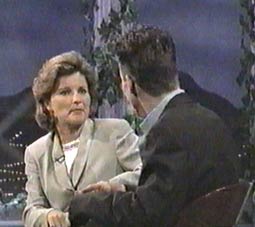 Kate:
What are you suggesting I should do in my house?
Kate:
What are you suggesting I should do in my house?
Joe: I think you just teach your kids to be responsible.
Kate: Right.
Joe: And we have to let kids understand what this stuff can do to them Most teenage pregnancies, kids are high on booze or pot.
Jenica: I want to make something clear, because the reason I wanted to do this particular topic was -- I want to make this clear. I'm 22 years old. There's hemp out and there's this whole paraphernalia that's very popular with the marijuana leaves and it's come back like it's the '70s cool drug. And this is a far-out theory, but this is my theory. There's a lot of computers and it's become "How-to thousand." And we don't really talk to each other anymore. And so the kids are nullified. People my age are nullified. They have no communication. So the -- you can't grab your kid's hand and say, "Don't smoke this weed, it's bad," tsk. You can just communicate with them and let them know the effects. And they're gonna have to do what they have to do, like you did and everybody else did. They're gonna have to do that. But if you keep the level of communication, they know where to go, they know somebody cares about them. None of my friends know where to go, they just don't, because we go to our computers and they talk about it on cybernet.
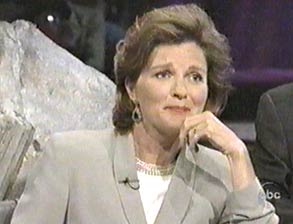 Kate:
Because they didn't know at 16 where to go, at 14 where to go?
Kate:
Because they didn't know at 16 where to go, at 14 where to go?
Jenica: I mean, it's a far theory, but computers are the problem.
French: It's out there.
[ Laughter ]
Kate: Don't say that, for God's sake.
French: I think there's more help out there now than there's probably ever been. And there's an awful lot of crap, too. There's a lot of crap on top. I don't necessarily want all of this stuff on television. I mean, there's a lot of horrific stuff on television, particularly on the Fox network, surprisingly.
[ Laughter ]
For some reason. But you know, it's the price tag. You know, it's like when animals rob banks on Fox.
[ Laughter ]
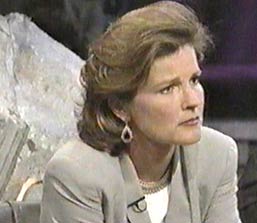 Kate:
What do you mean? What's that doing to you?
Kate:
What do you mean? What's that doing to you?
French: What I'm saying is that there's so many pitfalls out there and there's so much stuff, I don't necessarily want it on there, but it's the price tag for freedom.
Bill: Nobody's talking to young people in a sort of an honest, forthright way.
Joe: That's very important.
Bill: No disrespect. But, sir, when kids hear you talking about drugs, they go "That guy doesn't know about them." So whatever he's telling me, he's --
Jenica: But if I say -- if I say just say no to people my age, they won't listen either. If I say, "This is what I did. This is my experience. This is who I woke up with after I drink this and I'm so young, let's talk about this," I'm embarrassed. They're going to listen to me.
Joe: Let's talk about it.
[ Laughter and applause ]
No, I would know -- I would know that, Democrat that I am, that when Nancy Reagan kept saying, "Just say no," we cut drug use in this country, marijuana use and cocaine use in half -- in half!
[ Laughter ]
French: No!
Joe: Please!
French: That was the stupidest campaign ever.
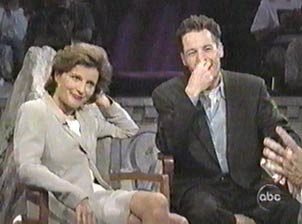 Kate:
Dole ought to know. Just say no.
Kate:
Dole ought to know. Just say no.
French: Just say no to anything. Okay, it's all fixed. We're perfect.
Joe: That's right -- The thing with Jane was it's the culture, it's the culture. It was the hugest waste of money ever. She didn't spend a cent.
French: Who was printing up those t-shirts?
[ Laughter ]
Jenica: Those bumper sticks costs millions.
Joe: People did it on their own.
Kate: The bottom line, 'cause there's no black and white here, we were discussing that during the break. Nobody has an ardent and devoted position on this, with the possible exception of yourself here. But I'm saying if you're going to tell me you're not going to preclude liquor, tobacco, or whatever else I want, marijuana, in my household, the game opens up, doesn't it? You think those kids looking at their mother having her third Martini going, "And by the way, when you're 18, maybe you can have a drink" -- you know, what's the message?
Joe: And we know that if you're sending that message, we know the odds increase enormously your kid's gonna do the same thing.
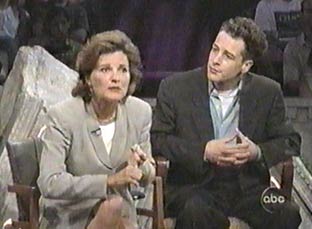 Kate:
Right.
Kate:
Right.
Joe: Okay?
But if you're not doing that, we know you're doing a lot for your kids. Just your example is very important.
[ Applause ]
Bill: I wish we could go on with this, but, again, commercial.
[ Applause ]
Bill: Okay. Monday we're going to have Jason Alexander, Robin Leach, Poe and Lisa Schiffren. Okay, they just want us to say in the meantime, your kids are going to be great because they have a cool mom who's on "Star Trek."
[ Applause ]
Kate: Thank you.
Bill: And by the way, why do -- why do prescription drugs sound to me like "Star Trek" characters? Zoloft?
[ Laughter ]
------------------------------------------------------------------
©1997 Brillstein-Grey Communications
